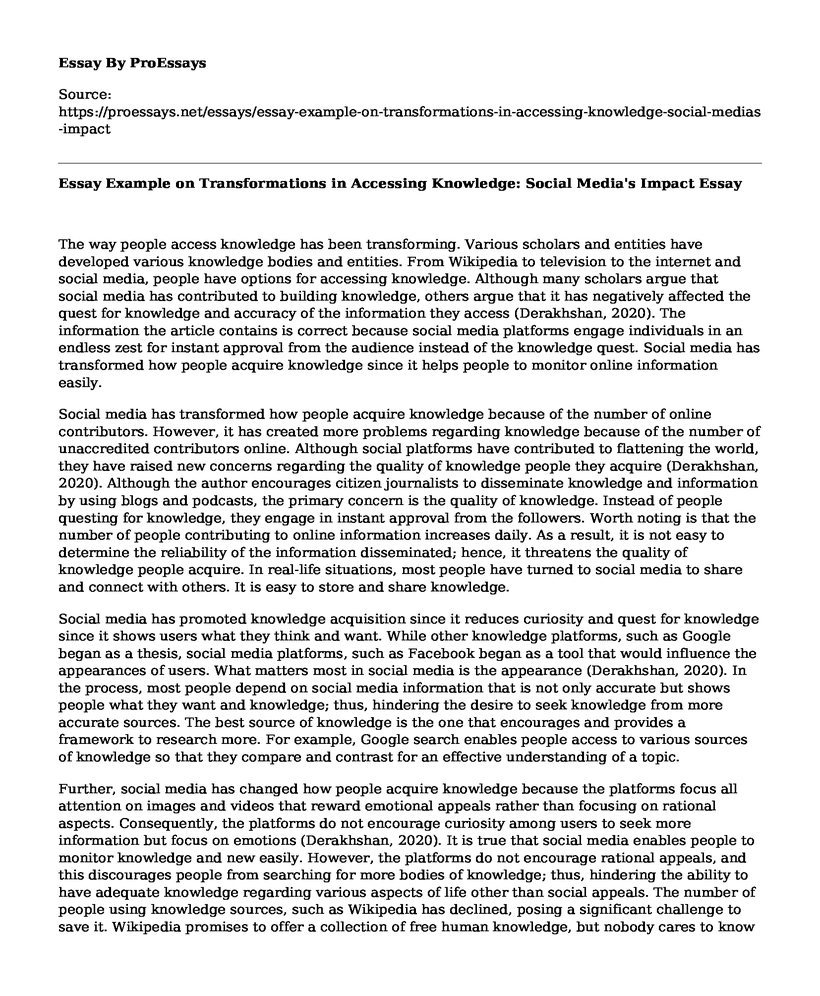The way people access knowledge has been transforming. Various scholars and entities have developed various knowledge bodies and entities. From Wikipedia to television to the internet and social media, people have options for accessing knowledge. Although many scholars argue that social media has contributed to building knowledge, others argue that it has negatively affected the quest for knowledge and accuracy of the information they access (Derakhshan, 2020). The information the article contains is correct because social media platforms engage individuals in an endless zest for instant approval from the audience instead of the knowledge quest. Social media has transformed how people acquire knowledge since it helps people to monitor online information easily.
Social media has transformed how people acquire knowledge because of the number of online contributors. However, it has created more problems regarding knowledge because of the number of unaccredited contributors online. Although social platforms have contributed to flattening the world, they have raised new concerns regarding the quality of knowledge people they acquire (Derakhshan, 2020). Although the author encourages citizen journalists to disseminate knowledge and information by using blogs and podcasts, the primary concern is the quality of knowledge. Instead of people questing for knowledge, they engage in instant approval from the followers. Worth noting is that the number of people contributing to online information increases daily. As a result, it is not easy to determine the reliability of the information disseminated; hence, it threatens the quality of knowledge people acquire. In real-life situations, most people have turned to social media to share and connect with others. It is easy to store and share knowledge.
Social media has promoted knowledge acquisition since it reduces curiosity and quest for knowledge since it shows users what they think and want. While other knowledge platforms, such as Google began as a thesis, social media platforms, such as Facebook began as a tool that would influence the appearances of users. What matters most in social media is the appearance (Derakhshan, 2020). In the process, most people depend on social media information that is not only accurate but shows people what they want and knowledge; thus, hindering the desire to seek knowledge from more accurate sources. The best source of knowledge is the one that encourages and provides a framework to research more. For example, Google search enables people access to various sources of knowledge so that they compare and contrast for an effective understanding of a topic.
Further, social media has changed how people acquire knowledge because the platforms focus all attention on images and videos that reward emotional appeals rather than focusing on rational aspects. Consequently, the platforms do not encourage curiosity among users to seek more information but focus on emotions (Derakhshan, 2020). It is true that social media enables people to monitor knowledge and new easily. However, the platforms do not encourage rational appeals, and this discourages people from searching for more bodies of knowledge; thus, hindering the ability to have adequate knowledge regarding various aspects of life other than social appeals. The number of people using knowledge sources, such as Wikipedia has declined, posing a significant challenge to save it. Wikipedia promises to offer a collection of free human knowledge, but nobody cares to know its efforts. In real-life situations, people turn to platforms, such as Wikipedia to search for more formal and research information, while they use social media to share social information. Therefore, social media has transformed knowledge acquisition.
Conclusion
Social media has transformed how people acquire knowledge since it helps people to monitor online information easily. The internet has made it easy for people to acquire and share information online. Since the medium focuses on videos and images, it manages curiosity among users, but it hinders quest for knowledge from more reputable sources, such as Wikipedia. Also, it is difficult to determine the reliability of information and knowledge disseminated due to the number of online contributors.
Reference
Derakhshan, H. (2020). How Social Media Endangers Knowledge." Gale Opposing Viewpoints Online Collection. Farmington Hills.
Cite this page
Essay Example on Transformations in Accessing Knowledge: Social Media's Impact. (2023, Jun 06). Retrieved from https://proessays.net/essays/essay-example-on-transformations-in-accessing-knowledge-social-medias-impact
If you are the original author of this essay and no longer wish to have it published on the ProEssays website, please click below to request its removal:
- Comparison of the Big Sleep Book to Movie
- Essay Example on School Reforms
- Paper Example on Mathematics Teaching
- Mission Impossible 5 - Rogue Nation Essay
- Autobiographical Sketch
- Paper Example on UK Building Regulations: Ensuring Safety, Accessibility, and Environmental Protection
- Jazz at Lincoln Center Orchestra Lights Up Rose Theatre with Tribute to Miles Davis - Essay Sample







